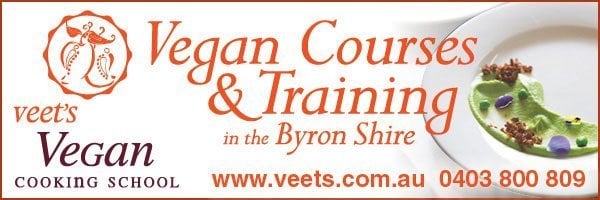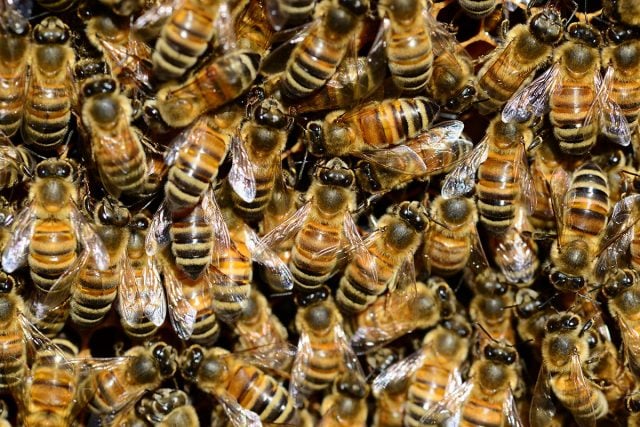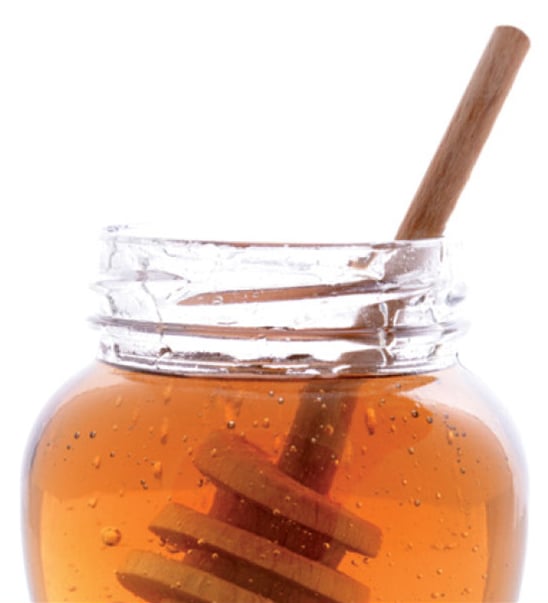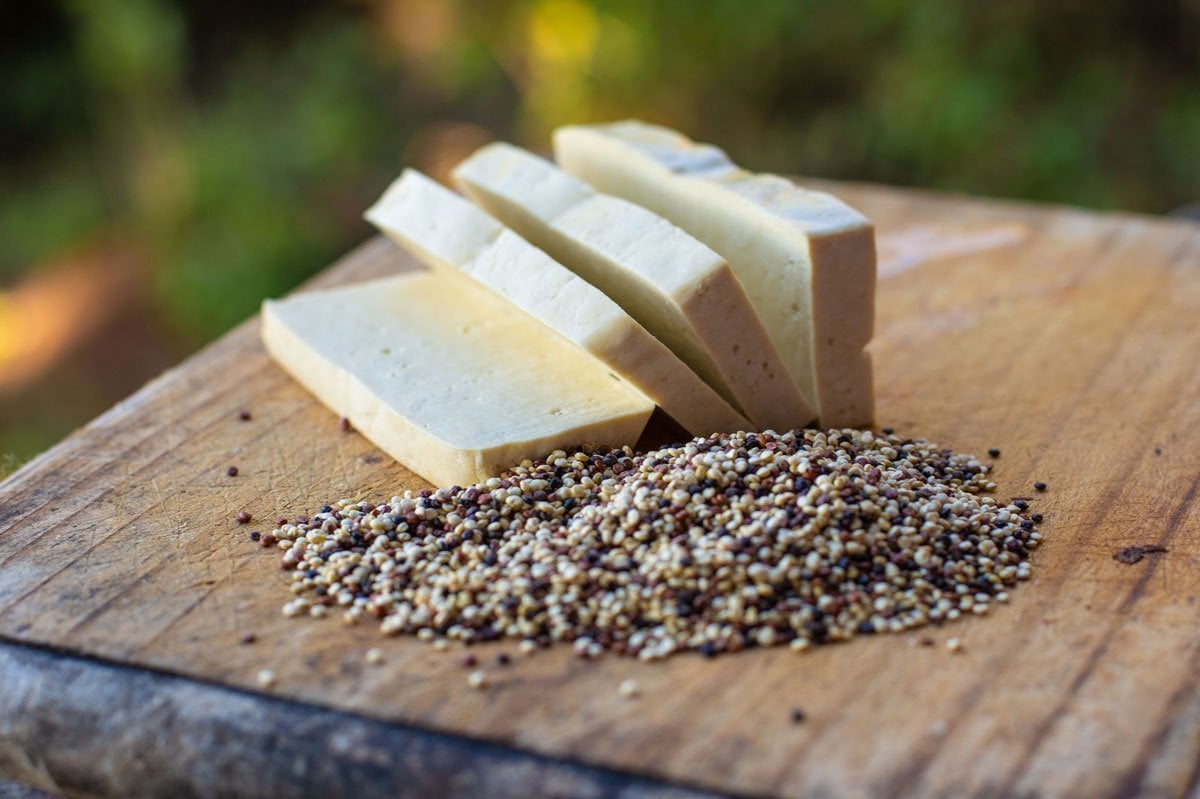
The buzz on bees
As I said in last month’s Being Vegan, one of the questions I get asked a lot is: why don’t vegans use eggs and honey?
Again, my personal reason for being a vegan is because I believe all the creatures on this planet are earthlings and as such we all deserve equal rights.
When it comes to consuming anything that belongs to another earthling, I ask myself: what was this ‘food’ item intended for? What was it created for?

It’s all about us – isn’t it ?
A funny thing happened on the way to writing this story. I was having a discussion with one of the elders in my life about this very question – she just couldn’t understand why honey was something I wouldn’t consume.
It was her understanding that bees made honey in the hives and we turned up all decked out in netted gear and smoke puffers and took the honey, and the bees smiled benevolently at us like something out of a commercial for spring.
When I asked her point-blank why she thought bees made honey, her response was: ‘Well they make it for us don’t they?’
Now there was a twinkle in her eye when she said it but this is the true problem with food today. Milk comes in bottles, meat comes in plastic wrap (drained of most of the blood), and honey comes in a squeezable bottle. Just turn it upside-down and voila!
She was being deliberately silly with the nutty vegan, but where there’s smoke there’s fire and a lot of the time humans do think that animals produce things for us.
Well, newsflash – they don’t!
What the experts say
Another funny thing happened on the way to writing this story. I got in touch with several bee experts and upfront I told them I was vegan.
The thing is, many (not all) bee experts are wedded to the honey industry – the two are inextricably linked and getting information for a vegan article from the bee experts is difficult because they know which direction I’m heading in.
I spoke to Dr Katja Hogendoorn, Senior bee researcher at the School of Agriculture, Food and Wine for the University of Adelaide.
Dr Hogendoorn was really helpful giving me information about bees and wanted to note that, while the honey bee industry supports her research, she is one of the few honey bee researchers who remain independently critical (e.g. by stating that managed hives have no place in conservation reserves until it has been unequivocally shown that their presence does not do harm).
The questions I asked Dr Katja were:
About (or actually) how many species of bees are there?
20,000 in the world, about 2,000 in Australia, about 1700 described in Australia.
About (or actually) how many species of bees produce honey?
In Australia: harvestable honey is produced by the European honey bee and three species of native sugarbag bees (stingless bees).
How long does a bee live for?
Honey bees: queens 2-7 years, workers 6 weeks. Native bees: between 4 weeks and 4 years depending on the species.
For the bees who make honey, how much would they produce in that life span?
I have no idea – Google it.
Dr Google said 1/12 teaspoon (yes folks, next time you put a teaspoon of honey in your chai, that’s the life’s work of 12 bees).
Why do bees make honey, that is, what is the purpose/s of the honey they make?
To have reserves for bad times.
Do they make more than they need? If so, why?
If they have room in the hive and nectar is available, they can store more.
Beekeepers give them heaps of room for honey production, compared to the space in natural hives inside tree hollows.

Mind you, the European honey bee is an introduced species in Australia (1820s), and one of the most invasive at that. It takes a lot of nectar and pollen out of the system, uses nesting hollows that are needed by birds and mammals and it is my view (says the expert) that feral hives should be eradicated. Unfortunately, this is unfeasible. Managed honey bees are a farm animal.
Is it hard work? I mean, it seems like hard work but maybe for a bee it’s not?
No, they are rather lazy, and spend most of the day on their backs in the frame.
If bees have a supply of honey and that supply is compromised, do they feel compelled to make more or do they cut their losses? That is, if their honey is taken away, do they stress about having enough? Do they work extra hard to make that honey back? Do they get anxious about producing enough and having excess in storage ‘in case’?
The beekeeper gives them the space for overproduction. He leaves them with enough to get by, normally. So no.
Is it stressful for them to have contact with other earthlings?
Yes, because they defend their hive. The other way is also stressful (honey bees stinging innocent passersby and bears).
I can see where you are going with this: ‘Let’s get up in arms…beekeepers stress the bees, and steal their honey…’
However, beekeepers give their managed hives ample support: They transport the bees to the honey sources; they leave them enough honey because they want healthy hives; managed hives are given ample room to expand and produce honey, feral hives cannot store that much – get stressed during lean times and die, often during summer. Managed hives are fed sugar or protein for example if they encounter a shortage in the landscape – and sugar is healthier for them than many kinds of honey. Diseases get treated. Feral hives do not get that cushy treatment.
Nature is a cutthroat business, and food is often in short supply for bees in general. And that is the most stressful issue for bees, because if there is not enough food they cannot feed the larvae/ produce their offspring. Many bees in nature (honey and solitary native) are encountering this, wild hives probably more so than managed ones that are transported and fed.
If you want to do something for bees, or for nature in general, campaign for habitat restoration and against deforestation, rather than against honey consumption and production.
I try to use the popularity of bees, and honey, which I have a profound dislike of, (says the expert!) to convince councils, community groups and people in general of the need to plant and maintain bee food. This serves to support all kinds of insect life, which then provides food for a wealth of birds, reptiles and small mammals – most of whom are also not vegan. It sends out a positive message and gives people simple directions as to how they can make a real difference. And this message is able to convince people from many walks of life.
It is cruel to farm animals, but unfarmed animals are also stressed. It is cruel to take food for wild animals [out] of the landscape. But that’s what we do when we grow plants to eat.
However, I think the cruelty of honey harvest is not something to worry about, as the honey-producing managed hives are having quite a cushy existence compared to the feral ones.
What I say
I have reproduced the Dr Hogendoorn’s answers in full – she was concerned I’d put words in her mouth but I have given her free-range. She had plenty of damning words without my help.
But I am going to pick her answers apart from a vegan’s point of view.
If a bee makes one 12th of a teaspoon of honey in their life, you can be damn sure that honey isn’t meant to go on toast.
‘Bees make honey to reserve for bad times and they make more if there is room in the hive’, said Dr Katja. Naturally, there’s only room in the hive for a small amount of extra honey, but beekeepers give them ‘heaps of room for honey production.’ That means the bees do fill that extra space with honey. No extra space, no extra honey making = bee holiday.
Honey is made for them not for us. Is it hard work? The Dr Katja said ‘no they are rather lazy’, but the phrase ‘busy bee’ doesn’t come from nowhere, and the way we see bees buzzing around, I kind of like the idea of them being lazy in their time off.
The Dr Katja said is ‘it is cruel to farm animals, but unfarmed animals are also stressed’. That’s right. All animals are stressed. As part of their natural lifespan – animals, bees and humans are all stressed, but farming animals, including bees, ads cruelty to the mix and bees do die in the production of making honey, bees that wouldn’t ordinarily have died in ‘feral’ beehives.
‘I think the cruelty of honey harvest is not something to worry about’, said Dr Katja. Well, I do!
I challenge any beekeeper, from the backyard enthusiast to the major commercial operations, to deny that bees die in the harvesting of honey for human consumption. And you can argue all you want that bees die anyway – of course they do, we all do, naturally, but any extra bee who dies in the commercial making or harvesting of honey, honey that they provide for themselves, not for humans, is one bee too many.
Bees already do enough for humans by pollinating about one-third of our plant food. They don’t need us to survive but we absolutely need them.
So why do bees make honey (if it isn’t for us)?
I asked Dr Google – Why do bees make honey?
The answer? ‘Honey bees make honey as a way of storing food to eat over the cooler winter period, when they are unable to forage and there are fewer flowers from which to gather food’.
It’s bee food. Not human food. Stealing it dismisses their earthling rights and enslaves them to produce food for us when what they want to do is make food for themselves. Even beekeepers use the term ‘rob’ in regards to honey harvest. Pretty much says it all.
Anyone who produces honey and says they care about bees, what they actually mean is, they care about honey and if you’re not convinced, ask a beekeeper this question: have you clipped your queen’s wings?
Oh yes they do!
Oh yes they bloody do!
I rest my case.
Now, maple syrup…
Also from our Being Vegan series:
Being Vegan: Let me tell ya ’bout the birds and the...
One of the questions I get asked a lot is: Why don’t vegans use eggs and honey?
Being vegan: Where do vegans get their protein?
You can eat a plant-based diet and get plenty of protein. Like any balanced diet, if you eat properly you will get all the nutrients you need. This is the first article in our monthly Being Vegan series.









You fail to make much point about the queen for which all the bees do their thing or else their kind ceases to exist, a point I would not expect a socialist vegan to miss really. And if we eat fallen fruit, the trees’ means of reproduction, surely this also wrong. I’m sure I must be wrong. Something da Vinci didn’t think about.
Last month was about a buncfh of questions Being Vegan, and one question was edging on the side of the plate of why don’t vegans use eggs and honey? There, Honey is a fork in the road and something to swallow, so let us take a knife and cut it down to size. In creation of life on Earth what came first the chicken or the egg? I pondered and being a busy bee I could not see the yolk, so I ate the chicken.
Birds are evolved dinosaurs and as such, the egg came first. You’re welcome.
Can i suggest that if you have not already read a book that’s been around since the 70’s
‘The Secret Life of Plants’ it may help to give an insight into plants, that you may not have considered before.. Also everything is universal energy in various forms, Form constantly changes, but, that which creates & sustains it, is pure quantum potential or pure consciousness or God. Whatever description of it that personally resonates for you.. i deeply understand your desire to respect all life & tread gently on the earth, & I’m sure you extended that to all, that, for their own reasons be it health or otherwise make other choices. Thank you for bringing awareness & the opportunity for people to maybe look more deeply at the choices we make… Namaste Rami
You know how to tell if someone is vegan, they will tell you.
You know how to tell someone is not a vegan? They wheel out this tired old joke 😉
Honey Bees (Apis Mellifera) live between 4 – 6 weeks. If there is not enough room in the hive the bees will Swarm and become a nuisance – Providing bees with enough room, managing bees to keep them healthy to pollinate crops – Yes food that Vegans eat!! – and husbanding the bees, moving them to crops especially Almonds, is part and parcel of a commercial beekeeper.
A good beekeeper will not remove honey from bees unless there is a surplus. Without bee farmers, vegans would not have quantity, quality, and diversity of fruit, vegetable, nuts, seeds and cereals to eat. Beekeeping is a symbiotic relationship with mother earth.
There are no foods in the world we eat that does not have a detrimental effect on the plant, the environment, or takes food from another animal. Humans have evolved to reap and sow, cultivate, farm and live off the land and animals. Our very physiology means we need animal fats and proteins to be healthy. Mother nature proves animals for other animals to live off. It is literally the law of the jungle. Natures law. But if you choose to be vegan or vegetarian, eat a bit of humble pie with your tofu stirfry and thank the Bees you have things to eat.